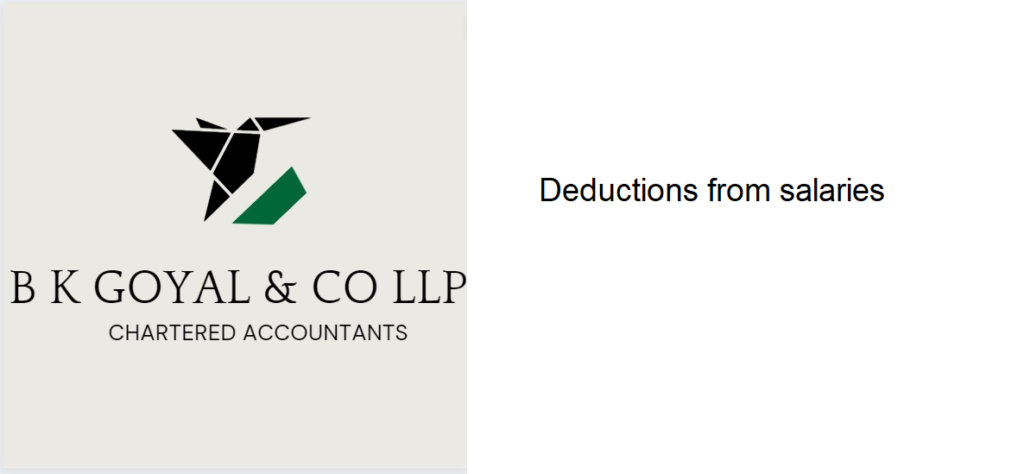To calculate income tax, it’s essential for salaried individuals to be aware of the various deductions they can claim from their earnings. The Indian Income Tax Act, 1961 allows for several exemptions and deductions to reduce taxable income and ultimately lower the tax liability. Here are some of the most prevalent deductions that employees can claim.
- Standard Deduction
The standard deduction is a fixed amount that all salaried individuals can claim, irrespective of actual expenses. In the fiscal year 2022-23, the standard deduction is Rs. 75,000. This deduction is intended to help employees cover expenses related to employment, such as transportation or uniforms.
- Professional Tax
Professional tax is a levy imposed by state governments on individuals who earn a livelihood through employment or a profession. This tax is deductible from salary income, with a maximum deduction of Rs. 2,500. However, it’s worth noting that not all states impose professional tax.
- Employee’s Provident Fund (EPF)
EPF is a retirement benefit scheme offered by most employers to their employees. Contributions made by the employee towards EPF are eligible for deduction under Section 80C of the Income Tax Act, 1961. The maximum amount that can be claimed as a deduction under this section is Rs. 1.5 lakh.
- National Pension System (NPS)
NPS is a government-backed retirement savings scheme open to all Indian citizens aged 18 to 60. Contributions made by the employee towards NPS are eligible for deduction under Section 80CCD(1) of the Income Tax Act, 1961. The maximum amount that can be claimed as a deduction under this section is Rs. 2 lakh.
- Medical Insurance Premium
Medical insurance premium paid by the employee for self, spouse, and dependent children is eligible for deduction under Section 80D of the Income Tax Act, 1961. The maximum amount that can be claimed as a deduction under this section is Rs. 25,000. For senior citizens (above 60 years), the maximum deduction that can be claimed is Rs. 50,000.
- Housing Loan Interest
Interest paid on a housing loan taken for the purpose of buying, constructing, or repairing a residential property is eligible for deduction under Section 24 of the Income Tax Act, 1961. The maximum amount that can be claimed as a deduction under this section is Rs. 2 lakh. This deduction is only available for self-occupied properties.
It’s crucial to understand and utilize these deductions to reduce tax liability and maximize savings. Employees are advised to seek the guidance of a tax expert or a financial advisor to make the most of these deductions and plan their finances accordingly.
section 16 of Income Tax Act, 1961
The income chargeable under the head “Salaries” shall be computed after making the following deductions, namely :—
(i) [***]
(ia) a deduction of fifty thousand rupees or the amount of the salary, whichever is less;
(ii) a deduction in respect of any allowance in the nature of an entertainment allowance specifically granted by an employer to the assessee who is in receipt of a salary from the Government, a sum equal to one-fifth of his salary (exclusive of any allowance, benefit or other perquisite) or five thousand rupees, whichever is less;
(iii) a deduction of any sum paid by the assessee on account of a tax on employment within the meaning of clause (2) of article 276 of the Constitution, leviable by or under any law.
Services of B K Goyal & Co LLP
Income Tax Return Filing | Income Tax Appeal | Income Tax Notice | GST Registration | GST Return Filing | FSSAI Registration | Company Registration | Company Audit | Company Annual Compliance | Income Tax Audit | Nidhi Company Registration| LLP Registration | Accounting in India | NGO Registration | NGO Audit | ESG | BRSR | Private Security Agency | Udyam Registration | Trademark Registration | Copyright Registration | Patent Registration | Import Export Code | Forensic Accounting and Fraud Detection | Section 8 Company | Foreign Company | 80G and 12A Certificate | FCRA Registration |DGGI Cases | Scrutiny Cases | Income Escapement Cases | Search & Seizure | CIT Appeal | ITAT Appeal | Auditors | Internal Audit | Financial Audit | Process Audit | IEC Code | CA Certification | Income Tax Penalty Notice u/s 271(1)(c) | Income Tax Notice u/s 142(1) | Income Tax Notice u/s 144 |Income Tax Notice u/s 148 | Income Tax Demand Notice
